|
'Diane,
For the past week or so I have been practically living in Twin Peaks myself, as I have totally absorbed myself in this huge 10 disc boxset – watching at least three hours of the show a day. And now I have exhausted its contents I'm finding the readjustment into normal reality rather unfavourable,' as Special Agent Dale Cooper would probably have put it, addressing his Dictaphone and sipping on a hot cup of black coffee.
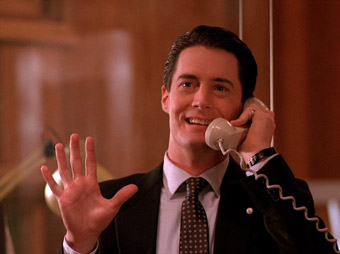
My appreciation of David Lynch's work stretches back to when I was about 14 and saw Eraserhead on Channel 4 (way past my bedtime). It filled me with wonder, dread, fear, excitement, fascination and irritation all at once. It wasn't until a few years later that I discovered his whole back catalogue, and with it Twin Peaks. At this point I had to satisfy myself with second-hand VHS copies that I found in various charity shops and bargain basements. (It took a long time to see the whole thing as I could only buy the odd few random episodes here and there whenever I saw them for sale) Anyhow, from the 1989 pilot I was hooked, and on its initial airing so were a lot of the American public. This came as a shock to the makers of series, as well as the network, due to the nature of the show.
Twin Peaks is a murder mystery. A supernatural murder mystery. Actually a supernatural murder mystery/soap opera/1950s teen drama, with a good helping of dry comedy. And that's putting it rather simply. So it's quite easy to see how many people didn't think that in a traditional and conservative television era a series like Twin Peaks would go down as well as it did. What Twin Peaks did in fact do was revolutionise US TV and reinvent the modern long-running TV drama. There had been nothing of this sort created since The Prisoner, and definitely nothing American. This is not the case today though as Twin Peaks laid the groundwork for numerous hit shows with a supernatural theme from The X-Files to Lost, not to mention how its cinematic approach to each episode and use of guest directors influenced the contemporary HBO greats – Six Feet Under, The Sopranos and later The Wire.
Twenty years on and the programme has lost nothing. Because Lynch uses his own visual style and method the world we see is his and not any specific time and place in the real world, creating an ageless environment. A combination of '50s Americana and dark surrealism, Twin Peaks could easily exist in the same world as Blue Velvet and even Wild At Heart, the two features the first series is sandwiched between. For me this is probably Lynch's golden period – not quite as pitch black as Lost Highway, nor as narratively impenetrable as the relatively recent Inland Empire. But before we get too far into Lynch's role I must correct an error many reviewers make. Twin Peaks is as much Mark Frost's creation as it is Lynch's and it is an all too familiar story that Frost is overshadowed by the more well known and recognisable half of the partnership. Thankfully the extras on this set make this point clearly, with Lynch himself commenting on the partnership. With this said let's look at both seasons specifically.
The set begins with the feature length pilot made in 1989. At this point no one knew if there would be a series so Lynch and Frost put all their creative eggs in one basket to make something memorable regardless of its success in winning over the network. What we get is something that comes across as a David Lynch movie in its own right, plus there is the option to watch a closed ending made to cover the eventuality of it not getting commissioned as a series and therefore would have screened as a stand alone made for TV film. I will discuss this alternative ending later.
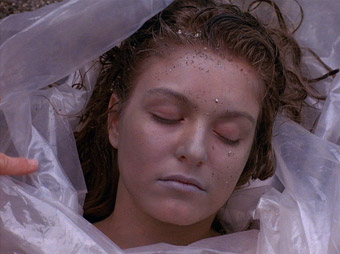
The pilot sets the scene; in a small town on the Canadian border a high school girl is found murdered so a rather unorthodox FBI agent arrives to solve the case. He encounters the unusual world of Twin Peaks and its inhabitants and becomes more and more involved in the mystery of the murder and the people suspected of the crime.
There is a fantastic cast of oddball characters introduced in the pilot – a woman who carries around a log as though it were her baby (it happens to have important information in the case), a clumsy deputy policeman and his ditsy receptionist girlfriend, the power-hungry Benjamin Horn and his beautiful dreamily feline daughter Audrey, as well an eccentric fisherman played by Lynch favourite Jack Nance and his megalomaniac wife, brilliantly captured by Piper Laurie (just to name a few). But the accolades must really go to Kyle MacLachlan as Special Agent Dale Cooper. From his opening speech addressed to his Dictaphone whilst driving into Twin Peaks it is clear Agent Cooper was the role MacLachlan was born to play, and the role Lynch was born to write. There is more than a touch of the director's own idiosyncratic personality in Cooper, not to mention his quirky humour and love of coffee. I can safely say that there is not one scene in the entire series, let alone the pilot episode, with Agent Cooper in that I dislike. MacLachlan brings a magic to the role that makes it easy to see why the show was such an overnight success, although, he is far from the only iconic and wonderful feature of the series.
From the first seconds of Angelo Badalamenti's score the world of Twin Peaks becomes sonic as well as visual. The opening bars to the theme are as individual and recognisable as any of the characters, plots or imagery that recur as powerful motifs of the show. All Badalementi's music has a place intrinsic to the atmosphere of each character and setting, be it the cool jazz that introduces Audrey or the dark drones of sinister malevolence surrounding Laura Palmer's death – also the sensitivity with which the discovery of her murder by her parents and her friends is wonderfully underscored in sadness. It is in one such scene where the other stand out performance of the pilot and series first shows his fantastic emotionally evocative capacity – that of Ray Wise as Leland Palmer, the father of Laura. His reaction to her death sets the tone for his continuing mental deterioration throughout the show, often a darkly comic character in his decent into madness, Wise plays the role with a ferocious commitment.
Each episode of the first series is great in its own right and builds the mystery and intrigue to a multi cliff-hangered climax. Much of the success and coherence of this first season comes from the attention paid to it by its creators. As a short (seven episode) commission a lot is packed into these shows, but thanks to the writing and directing it never seems difficult to follow or rushed. In fact there is a sauntering and relaxed pace to the series connoting the country living ways of the Twin Peaks community on one hand, and the creeping evil of the forests on the other.
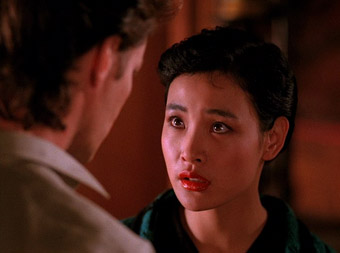
What the first seven shows manage to do is create a solid foundation of character and plot but never giving in to convention or generic norms of television. There is a beautiful hint of a twisted Dynasty or Dallas ostentation in the double crossing power struggles between Ben Horn and Catherine Martell (Laurie) combined with the almost American Graffiti '50s style of the teenage characters, all mixed in with something that is pure Lynch; surreal, heightened and oddly poignant. All these elements fuse together the most effectively in these early episodes.
There has been a lot said about the second, and far lengthier, season of Twin Peaks, much of it negative. Critics, fans, cast and crew alike have at least some misgivings regarding its plot development. Basically the mystery of Laura Palmer is solved relatively early on in the series due to pressures from the network. As the foundation story for the programme its solving created a problem in how to carry on from there. Also Lynch and Frost both had feature film priorities during the production of the second series, and as they took their eyes off the ball, the vacuum was filled with many different and conflicting voices, making for a wayward and unfocussed lull in the middle of the season. Viewing figures dropped and sadly even as the last few hours of the show picked up in quality it was never considered for a third season.
Now those are the facts, but personally I have no major problems with the second season. The first third is undeniably better and picks up flawlessly where the first had left off. The opening scene of the first episode is one of the funniest, oddest and most excruciatingly frustrating I have ever seen. The first part of the season sees a freedom of movement that makes for some really creative ideas, and due to the success of the first season the show could afford the leeway to explore just how far things could be taken. There are some truly insane turns by Ray Wise that you cannot help but lap up, Cooper is flawless as always, and there is the welcome return of the wonderfully sarcastic and bitter forensics expert, Albert (Miguel Ferrer), who reveals a gentler side in this second series. The mid-season crescendo, where Laura's murderer is revealed, is fantastically emotionally charged, but creates a hollowness to the next few episodes as it just seems to be winding down and not amping up to anything exciting.
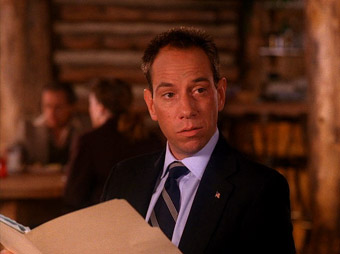
There is a fair amount of silliness during this era of Twin Peaks – one character emerges from a coma with super-strength, under the illusion she is still at high school, even though she is a thirty-five year old married woman. This is fun enough until the story is stretched to breaking point with her enrolling back into the school and dating one of the popular boys. Ben Horn also suffers a breakdown, concluding with a civil war re-enactment and then goes on to become a reformed character. Around this time there is a lot of off-centre plot wanderings and digression that unsurprisingly cost the show a lot of ratings. The lowlight of these would have to be the completely pointless story of 'Little Nicky' and his apparent demonic possession that sputters out with no conclusion and remains a completely uninteresting mystery to this day.
With the introduction of Windom Earle things do pick up, and the supernatural elements begin to correlate into something coherent with the Black and White Lodges. Also there are some great guest stars in the second season – David Duchovny appears as you have never seen him before as a cross-dressing FBI agent, and Lynch himself creates a truly iconic figure in Gordon Cole, Cooper's boss.
This all builds up to a final episode directed by Lynch that makes up for any drop in quality earlier on. A truly disturbing and surreal piece of filmmaking, apparently Lynch turned up on set without the proposed script and made it up as he went. Who knows how true this is but it seems possible as things take a creepy and wholly disorientating turn when Cooper enters the Black Lodge in search of his kidnapped girlfriend. The ending sets up a third season, but can been read as a horrible conclusion of its own, the final Twin Peaks pill Lynch makes us swallow is indeed a bitter one.
OK, I was a little nervous about the prospect of the UK release of the Gold Box Edition, not for the content but the prospect that the whole thing might be NTSC to PAL converted over from Paramount's 2007 American release. Just why it's taken so long to reach the UK is a mystery, particularly as the set has been available in parts of Europe and Scandinavia for two-and-a-half years – the one I already own is a Finnish release, which has multi-lungual menus, German, Italian and Spanish dubs and Danish, Swedish, Nowegian and – of course – Finnish subtitles. And it's a wondrous thing to behold, with a beautiful PAL transfer remastered from the original negatives and the sound remixed to full 5.1, all with the full approval of Mr. Lynch himself. Fortunately, with the exception of some subtitle and sound options, the UK release from Universal Playback is essentially the same release right down to the menu design, featuring PAL transfers from the original negative which boast a lovely richness to the colour, an excellent level of detail and pitch-perfect contrast pretty much throughout. That the film grain is visible in most scenes is not an issue as it's never intrusive. And it all upscales wonderfully. This is one of those shows I'm just so glad was shot on 35mm film.
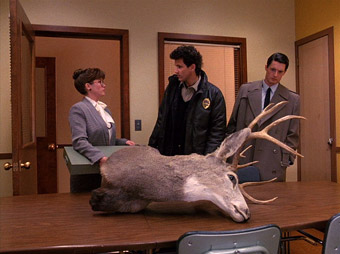
The 5.1 remix doesn't differ drastically from the Dolby 2.0 surround of the original broadcasts but does have that extra punch on the bass notes, of which there are many in Baldalamenti's moodily sinister score. Clarity is excellent and serves Lynch's typically precise sound design well, and the around-the-room enveloping effect of the score and natural sound effects (the wind in trees at Laura's funeral, for example) add greatly to the atmosphere.
What is missing from the UK version are the alternate languages and subtitles – English subs only here – and the original Dolby 2.0 soundtrack for comparison, which was included on the Scandanavian set.
Each episode has a Log Lady Introduction which roughly a couple of minutes of her introducing the themes of the episode in her unique way, the really just set the scene and atmosphere for the programme.
The alternative ending on the first disc shows what was filmed as a closed ending to the pilot, a very surreal and not altogether convincing sequence, some of which is used later in the series. It shows the genesis of Killer Bob, the one armed man and the red room concepts in their infancy and is the first time the backwards filming technique was used in the series.
Other than the ones above, all the extras reside on the tenth and final disc of the set. This is a packed disc of features featuring the following.
A Slice of Lynch (30:02) is an interview with David Lynch in a Twin Peaks style diner with actors Kyle MacLachlan, Madgen Amick and associate producer John Wentworth. A lot of ground is covered in the relatively short conversation between the four, from the genesis of the project to favourite scenes and characters. Lynch is his usual quirky and amiable self and the only negative thing I have to say about A Slice of Lynch is its running time – one could listen to this interesting informal chat for at least double its length, especially as it is regrettably the only extra to feature Lynch himself.
Secrets from Another Place (105:59) is second on the list and can be viewed in individual chapters or all at once as a feature length documentary. It covers the entire project from its creation by Frost and Lynch through production of the pilot and both seasons and their reception once initially aired. There is also a chapter with composer Angelo Badalamenti focussing solely on the music of the show. This is a great documentary featuring interviews with many cast and crew; it is especially nice to see Mark Frost play a big part in talking us through the life of Twin Peaks, as he is too often bypassed, yet Lynch is notable for his absence in the piece. I thoroughly enjoyed finding out the whole story of the project which was a surprise success and has become a cult classic since. My highlight has to be Badalamenti talking through how the iconic and beautiful theme song was written with the help of Lynch and a tape recorder. This extra is definitely the standout feature of the set.
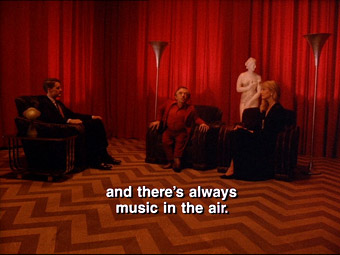
The next additions are two segments from the episode of Saturday Night Live presented by Kyle MacLachlan aired in September 1990. The first is the opening monologue (4.27mins), a cringe-worthy piece of American prime time silliness where MacLachlan pretends to let the cat out of the bag regarding the Laura Palmer mystery. The second is a Twin Peaks spoof sketch (9.06mins), equally ridiculous, although having the odd humourous parody – the Leland Palmer isn't too bad and Cooper's refusal to accept Leo's confession as the basis of the sketch is worked to breaking point. It's a shame MacLachlan put his name to all this mainstream nonsense in my humble opinion.
Return to Twin Peaks (19:43) is the third CBS DVD documentary following A Slice of Lynch and Secrets from Another Place and is concerned with the 2006 Twin Peaks Festival held at the location of the pilot (and later the prequel film Fire Walk with Me). It shows the weird and wonderful world of this unique annual convention with interviews from participants, organisers and star guests. What really comes across is how much of a cult phenomenon Twin Peaks has become and continues to be, with a cross-section of the American public travelling from all over the country to attend. There are an assortment of events including a coffee and pie picnic with themed games like the Tibetan rock throwing contest, a fancy dress competition and a log cabin Q&A with celebs from the show (by 2006 they seem to have been scraping the barrel as the two star guests are the Sheriff's receptionist, Lucy, and a the surviving victim of Killer Bob, who only appears in a handful of scenes throughout the entire show). There is also an interactive map with scenes describing what locations were used for the series and where to find them.
The last on the list is a collection of features called The Black Lodge Archive, really for diehard fans only, which contains the music video for the Julee Cruise song using Badalamenti's theme music, Falling (4:18). This is just a montage of clips from the show intercut with her singing, nothing to get too excited about. Then there are image galleries featuring on-set photos, promotional material and pictures of the trading cards series that came out at the time of the show, then an extensive set of twelve on-air promos/TV spots the ABC network made for advertising the show. The 1-900 hotline feature is dedicated to the promotional telephone catch up service the network provided during the initial airing of the series, it includes the TV advert for the service as well as a full set of the recordings made for the hotline (a total of eight, each roughly two and a half minutes long, featuring the voices of Lucy and Deputy Andy). The final feature on this crammed disc is called Lucy Bumpers and consists of six audio recordings by Lucy designed to as a segue into commercial breaks. Like I say, these are really for the diehard fans only.
This Gold Box edition is an essential addition to any Twin Peaks fan's DVD collection, although you may question its value if you already own the first season (as the second season sold separately comes out the same day as the Gold Box set), despite the impressively remastered picture. If you are a Lynch virgin then this is a perfect place to start, but if you are just a fan of creative and original television this groundbreaking series is a total must.
* Dale Cooper
|